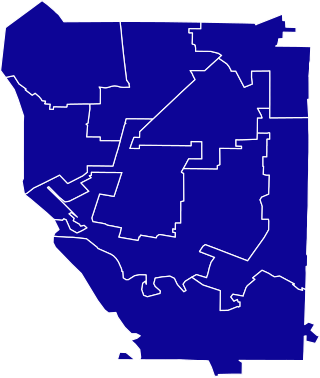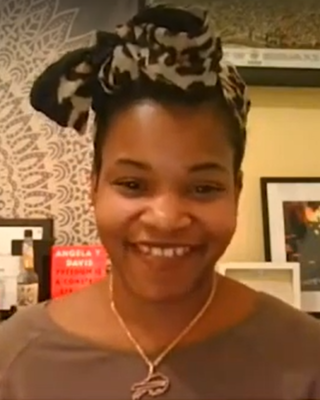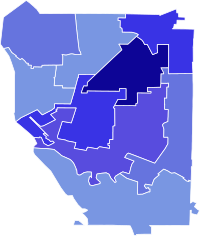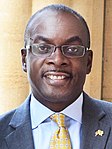
The Conservative Party of New York State is an American political party founded in 1962 following conservative dissatisfaction with the Republican Party in New York. Running on the Conservative Party line, James L. Buckley won election to the U.S. Senate in 1970 and served for one term. Since 2010, the party has held "Row C" on New York ballots—the third-place ballot position, directly below the Democratic and Republican parties—because it received the third-highest number of votes of any political party in the 2010, 2014, 2018, and 2022 New York gubernatorial elections. The party is known for its strategy of attempting to influence the Republican Party in a more conservative direction.

James Donald Griffin was an American politician who served in the New York State Senate and then for 16 years as the Mayor of Buffalo, New York (1978–93). He later returned to public life serving as a member of the Buffalo Common Council.

Byron William Brown II is an American politician who served as the 62nd mayor of Buffalo, New York from 2006 until his resignation in 2024. He was the city's first African-American mayor and longest-serving mayor of Buffalo. He previously served Western New York as a member of the New York State Senate and Buffalo Common Council. He is the first African-American politician elected to the New York State Senate to represent a district outside New York City and the first member of any minority race to represent a majority-white New York State Senate district. He announced in a September press conference that he would resign as mayor of Buffalo sometime in October. Brown's resignation took effect on October 15, 2024, with Christopher Scanlon serving as acting mayor until the next mayoral election in 2025.

Alfred "Al" Coppola is a former state senator and politician in New York. A resident of Buffalo, New York, Coppola is a long time political figure in the city, who served briefly as the 57th District member in the New York Senate at the turn of the 21st century.

The 2010 New York gubernatorial election was held on Tuesday, November 2, 2010. Incumbent Democratic governor David Paterson, elected as lieutenant governor in 2006 as the running mate of Eliot Spitzer, initially ran for a full term but dropped out of the race. Democratic New York Attorney General Andrew Cuomo defeated Republican Carl Paladino to become the next governor of New York.

Jane Lewis Corwin is an American politician and businesswoman who currently serves a Commissioner of the International Joint Commission for United States and Canada. She previously served as a Republican Party member of the New York State Assembly from 2009 to 2016. She represented the 144th Assembly District which covers parts of Erie and Niagara counties. Corwin was also the Republican Party nominee in the special election held on May 24, 2011, to fill Western New York's 26th district seat in the U.S. House of Representatives previously held by Republican Chris Lee. She faced three other candidates in the election, losing to Democrat Kathy Hochul 47 percent to 42 percent.

A mayoral election took place in Buffalo, New York, on November 3, 2009. Incumbent Democratic mayor Byron Brown won re-election to a second term.

The 2010 New York state elections took place on November 2, 2010. Due to the special election for US Senate, all of New York's six statewide offices were up for popular election on the same date. At the same time, all 29 members from New York of the U.S. House of Representatives, all 212 members of the New York State legislature, and many other local officials were elected.

Carl Pasquale Paladino is an American businessman and political activist. Paladino is the chairman of Ellicott Development Co., a real estate development company he founded in 1973.

A 2011 special election in New York's 26th congressional district was held on May 24, 2011 to fill a seat in the U.S. Congress for New York's 26th congressional district. The seat had been vacated due to the February 2011 resignation of married Rep. Chris Lee, who left office amid a scandal involving flirtatious emails and a shirtless picture he sent to a woman he met on Craigslist. Four candidates competed in the election: Republican Assemblymember Jane Corwin; Democrat Erie County Clerk Kathy Hochul; Green Party candidate Ian Murphy, editor of the Buffalo Beast; and independent candidate Jack Davis, a businessman running on the Tea Party line. On Election Day, Hochul won an upset victory, prevailing over Corwin by a margin of 47.24%-42.28%; Davis received 8.99% of the vote.

Michael P. "Mickey" Kearns is an American politician who serves as Clerk of Erie County, New York. Kearns previously represented the 142nd New York State Assembly District, which spans South Buffalo, half of the city of Lackawanna, West Seneca and Orchard Park, from 2012 to 2017; he has also served on the Buffalo Common Council. Kearns was elected Erie County Clerk in a 2017 special election.

The 2014 New York gubernatorial election took place on November 4, 2014. Incumbent Democratic governor Andrew Cuomo sought re-election to a second term in office, though incumbent lieutenant governor Robert Duffy did not seek re-election. Cuomo and his running mate, former U.S. representative Kathy Hochul, won contested primaries, while Republican Rob Astorino, the Westchester County Executive, and his running mate were unopposed for their party's nomination. Astorino and Moss were also cross-nominated by the Conservative Party and the Stop Common Core Party.

The 2005 Buffalo Mayoral Election took place on November 8, 2005. After incumbent Anthony M. Masiello, a Democrat, announced on April 29, 2005, that he would not seek a fourth term as mayor, a field of several Democratic candidates emerged, from which New York State Senator Byron Brown emerged victorious in the primary election. In the general election, Brown went on to defeat Republican challenger Kevin Helfer, former member of the Buffalo Common Council for the University District, as well as two minor-party candidates. Buffalo's 2005 mayoral election is notable as the first in the city to be won by an African-American candidate.

The 2001 Buffalo Mayoral election took place on November 6, 2001. Incumbent Anthony M. Masiello, a Democrat, easily trounced his sole opponent in the primary, going on to win a third term with no serious opposition in the general election. Buffalo's 2001 mayoral election was notable for its uncharacteristic quietness, despite pressing issues such as allegations of environmental contamination in the Hickory Woods neighborhood of South Buffalo and chronic poverty and urban blight. This was speculated as being due to reticence on the part of would-be candidates to "challenge a powerful and well-liked mayor like Masiello", especially one with a campaign fund in excess of $1 million. It was also only the second time in history when the Democrats and Republicans endorsed the same candidate for mayor of Buffalo, a phenomenon made possible by New York State's electoral fusion law.

Nicholas A. Langworthy is an American politician serving as the U.S. representative for New York's 23rd district since 2023. He was formerly the chair of the New York State Republican Committee. Langworthy was named chair of the committee in July 2019 after having chaired the Erie County, New York Republican Committee since 2010. He was the youngest state chair in party history.

A special election was held to fill the remainder of the term in the United States House of Representatives for New York's 27th congressional district in the 116th United States Congress. Incumbent Republican Representative Chris Collins resigned from the House effective October 1, 2019, following his guilty plea to federal insider trading charges. The election was originally scheduled for April 28, 2020, but was postponed until June 23, 2020, due to the COVID-19 pandemic.

The 2021 Buffalo mayoral election was held on November 2, 2021. Democratic Mayor Byron Brown won his fifth term in office as a write-in candidate. Brown's victory marked the first time since 1985 that Buffalo did not elect the Democratic nominee for mayor.

India B. Walton is an American political activist and nurse. She defeated incumbent Mayor Byron Brown in the Democratic Party primary for the 2021 election for mayor of Buffalo, New York, before losing to Brown in the general election, where he ran as a write-in candidate.

The Buffalo mayoral election of 1977 took place in Buffalo, New York, USA, on November 8, 1977, and resulted in the election of Jimmy Griffin to his first term as mayor.
Christopher P. Scanlon is an American politician who is the current acting mayor of Buffalo, New York. He is Buffalo's 63rd mayor, having served since October 15, 2024 after succeeding Byron Brown.



















